icebergItalia Didattica dell'italiano nel Mondo L’indicativo presente dei verbi irregolari

icebergItalia Didattica dell'italiano nel Mondo L’indicativo presente dei verbi irregolari
As children we used to always go out on the street to play in the rain. Voi. uscivate. Ricordo quando uscivate sempre la sera. I remember when you used to always go out/come out in the evening. Loro, Loro. uscivano. Al tempo, uscivano da una brutta situazione. At the time, they were coming out of an ugly situation.
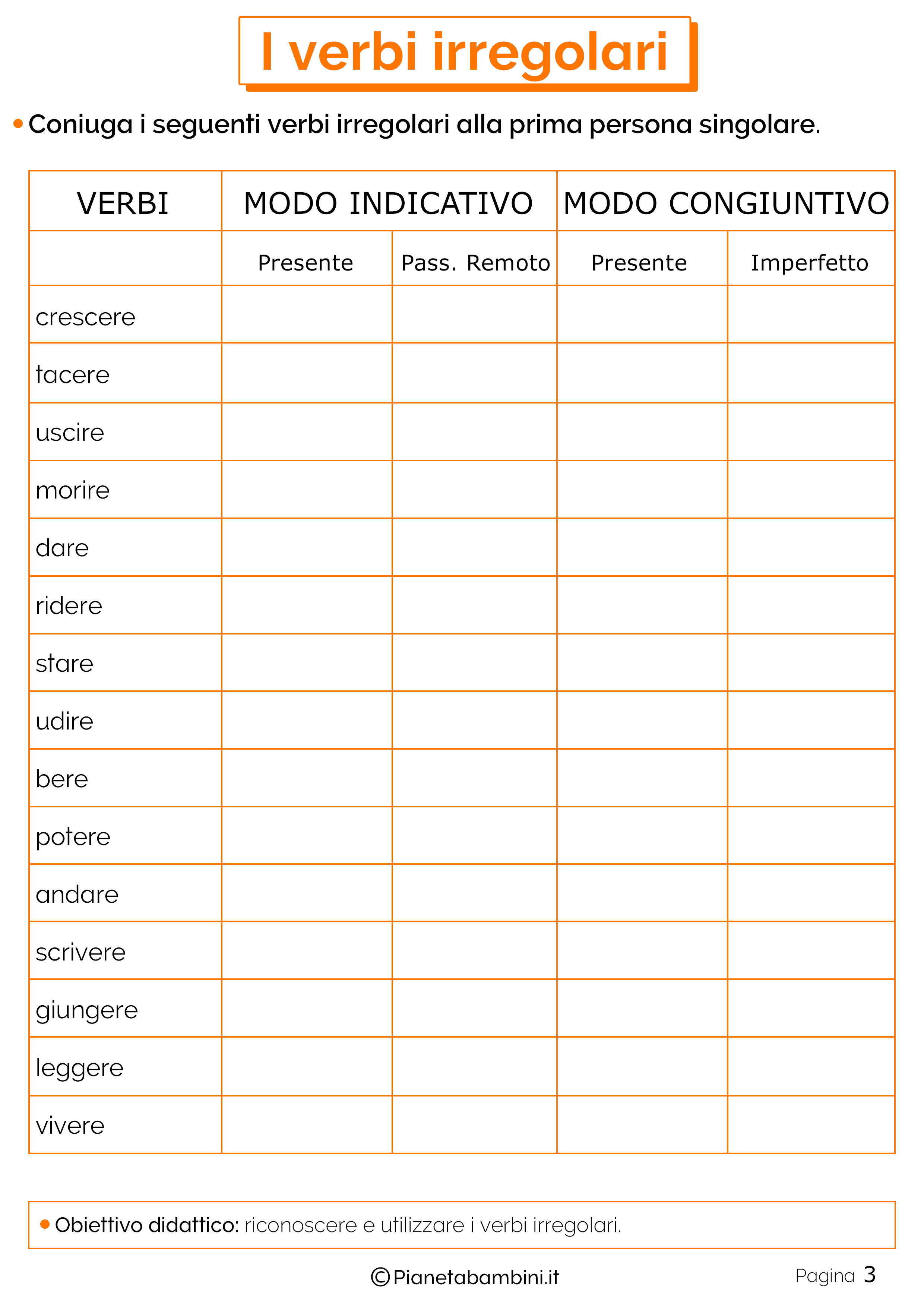
I Verbi Irregolari Esercizi per la Scuola Primaria
In questo post avete potuto studiare le forme dei verbi regolari delle tre coniugazioni "-are", "-ere", "ire" al presente congiuntivo, nonché alcune forme di verbi irregolari. Qui di seguito vi proponiamo altri 12 verbi irregolari (le forme in rosso sono irregolari). 12 verbi irregolari Note:

Le coniugazioni regolari e irregolari regole ed esempi Studenti Top
Studia con Quizlet e memorizza le flashcard contenenti termini come essere, avere, stare e altri ancora.
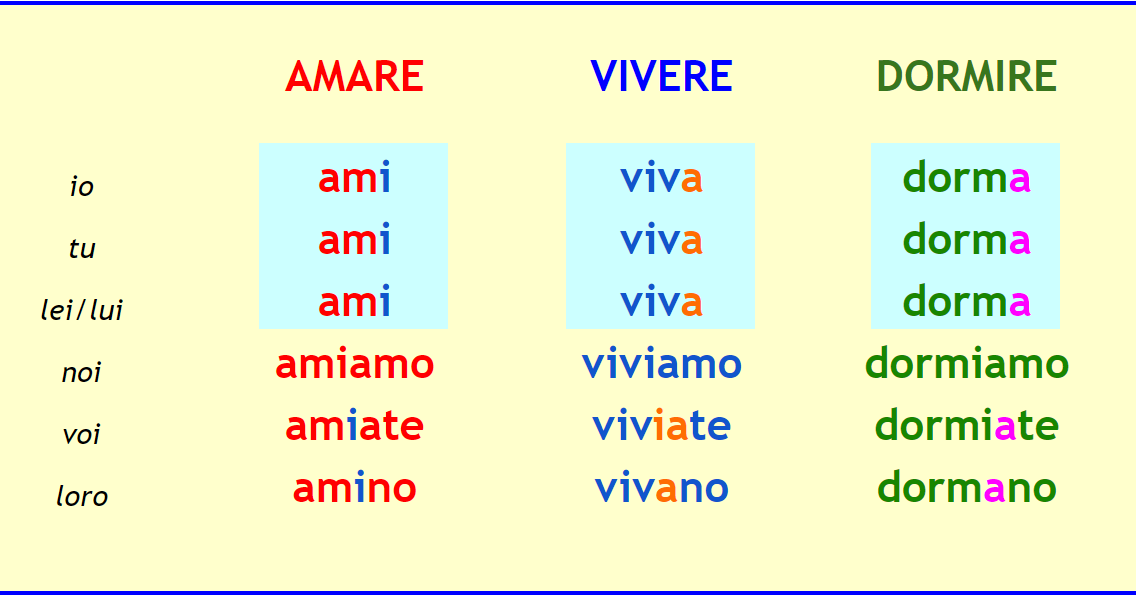
Il congiuntivo presente dei verbi Regolari e Irregolari Italian with Nicco Dite!
Study with Quizlet and memorize flashcards containing terms like fare (io-tu-lui/lei), fare (noi), fare (voi) and more.

Gli usi del congiuntivo Artofit
Study with Quizlet and memorize flashcards containing terms like Essere, Avere, Andare and more.

ECCO Verbi irregolari, Imparare l'italiano e Italia
86 Edizioni Edilingua † Nel congiuntivo presente il verbo andare segue il modello del presente indicativo: cambia la radice, eccetto nelle prime due persone plurali: andare vada, vadano andiamo, andiate Così si comportano anche i seguenti verbi: proporre, rimanere, scegliere, spegnere, tenere, togliere, uscire, venire. † Il verbo fare cambia la radice e la mantiene per tutta la.

PPT Il congiuntivo PowerPoint Presentation, free download ID2648571
Study with Quizlet and memorize flashcards containing terms like che io sia, che tu sia, che lui sia and more.

I Verbi Irregolari Esercizi per la Scuola Primaria Verbi irregolari, Scuola, Lezioni di
Il congiuntivo è il tempo verbale che si utilizza per collegare ("congiungere", appunto) le frasi subordinate alle frasi principali, con verbi che esprimono opinioni, desideri, speranze e aspettative, emozioni, sentimenti, dubbi, ipotesi Il congiuntivo presente
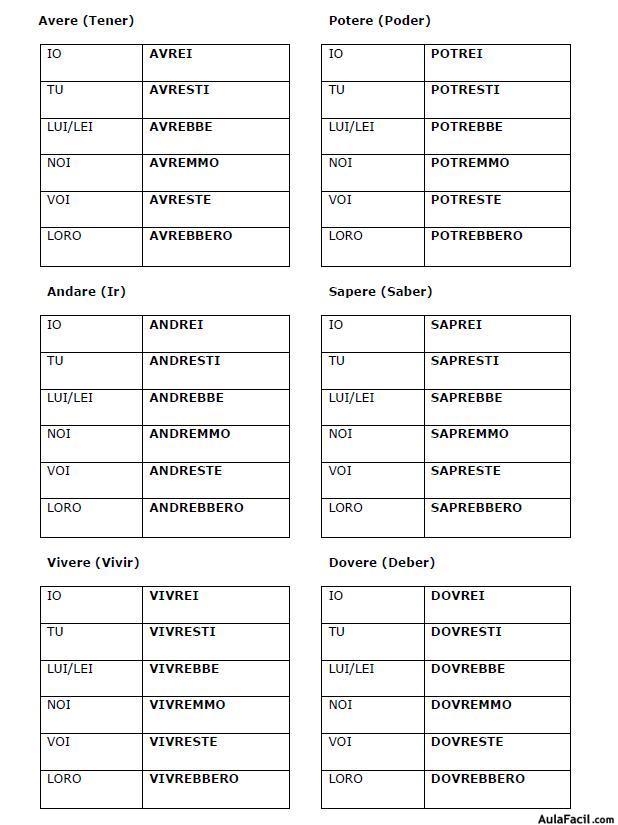
Condizionale presente irregolare Italiano B1 (1ª parte)
In our previous article about the Italian subjunctive, The Italian Subjunctive - 1. Present Tense, we looked at il congiuntivo presente. Today, we're going to examine le forme irregolari (irregular forms), once again in the present tense. These irregular verbs also happen to be the most important and frequently used. Here they are with practical examples

Presente Indicativo Verbi Irregolari
Congiuntivo presente Verbi irregolari Completa le frasi con i verbi coniugati al congiuntivo presente. Tutti dicono che Marco pensando di partire. ♦ È ora che voi qualcosa! ♦ Mi dispiace che voi già via! ♦ Immagino che tutti quell'escursione. ♦ Non credo che Umberto con noi stasera. ♦ Spero che tu una bella figura! ♦ È ora che tu un bel regalo! ♦
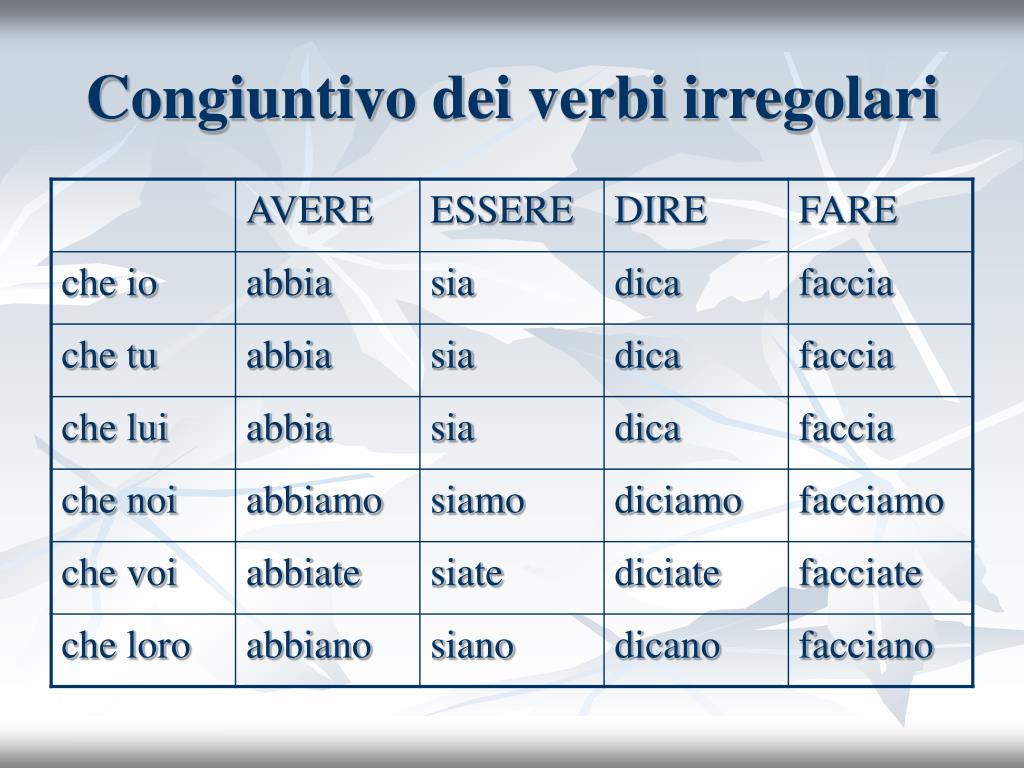
PPT Capitolo 14 PowerPoint Presentation, free download ID3515209
Il congiuntivo è il modo verbale della soggettività: permette di esprimere opinioni, dubbi, stati d'animo, desideri e tutto ciò che riguarda il mondo interiore. In italiano, esso ha 4 tempi: presente, passato, imperfetto e trapassato. IL CONGIUNTIVO PRESENTE
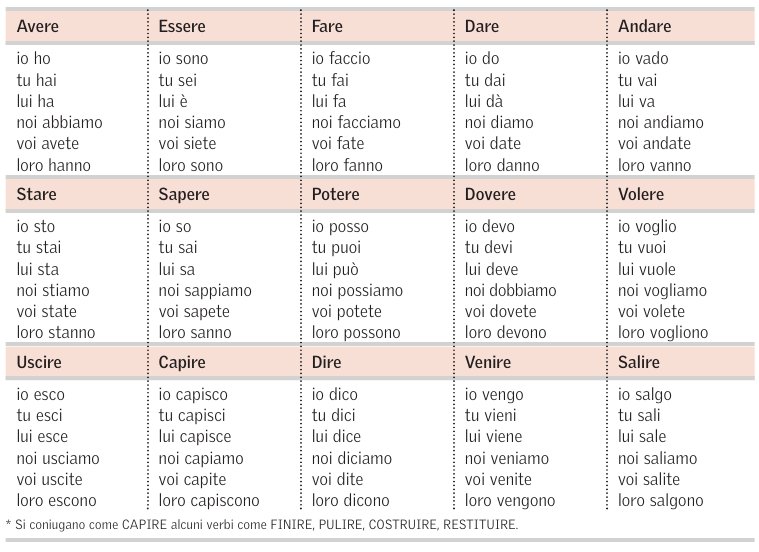
Altri verbi con presente irregolare
Una strategia per costruire il congiuntivo presente di molti (ma non tutti) verbi irregolari è quella di utilizzare la 1ª persona singolare del presente indicativo cambiando la vocale finale -o in -a. Alcuni esempi con i verbi irregolari: Spero che tu stia bene. Non penso che lei sappia guidare la macchina.
CLASS NOTES Verbi irregolari al congiuntivo (Lingua e cultura italiana avanzata)
Congiuntivo presente Verbi irregolari Scegli il verbo per completare le frasi. Che cosa vuoi che ? ♦ Dove vuoi che ? ♦ Pensi che tutti a dormire da noi? O qualcuno andrà in albergo? ♦ Dove vuoi che con questo tempo! Resteranno tutti a casa. ♦ Chi vuoi che con questo tempo! Staranno tutti a casa. ♦ Non credo che Marco bene. non ha una bella cera. ♦

IL CONGIUNTIVO PRESENTE VERBI IRREGOLARI 20140328آ 86 Edizioni Edilingua †Nel congiuntivo
Remember that with the verb essere (to be), you need to change the verb endings whether it refers to a man or a woman (or a group of men or women).. The congiuntivo passato is similar to the congiuntivo presente as you use it when talking about possibilities, opinions, desires, doubts. The difference is that the perfect subjunctive is used in the subordinate clause to express something.
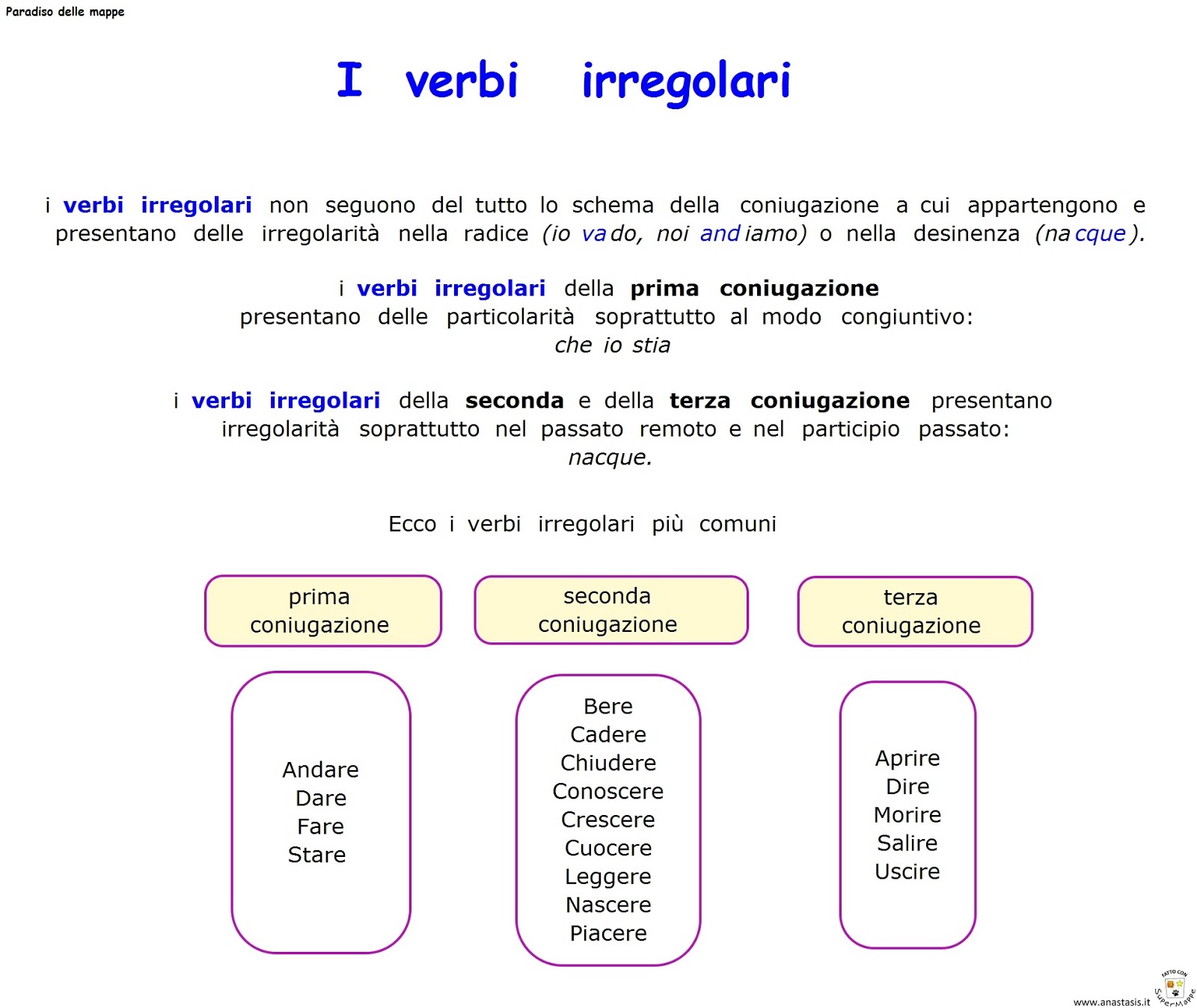
Paradiso delle mappe I verbi irregolari
Study with Quizlet and memorize flashcards containing terms like andare-io, andare- tu, andare- lui/lei and more.

VERBI IRREGOLARI 2.0 Presente INDICATIVO New AUDIO YouTube
How to Form the Present Perfect Subjunctive Mood (il congiuntivo passato) The congiuntivo passato is a compound tense formed with the congiuntivo presente of the auxiliary verb avere (to have) or essere (to be) and the past participle of the acting verb. For example: Sono contento che tu sia venuto alla mia festa! - I'm glad you came to my party!